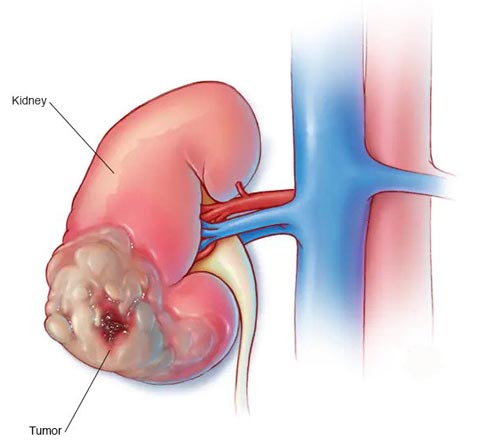Renal Tumor
What exactly are kidney tumors?
A tumor is an abnormal mass of tissue or liquid found in the body. Kidney or renal tumors are tumors that are discovered linked to the kidneys, an organ that serves to clean the blood that flows throughout the body. Renal tumors occur very rarely in children.
While the main cause of renal tumors in children is cancer, most tumors are discovered before they spread to other organs in the body, called metastasis. In cases of kidney cancer in children, most are not diagnosed until the tumor becomes quite large. As with many malignancies, swelling and discomfort may occur when the tumor mass reaches a certain size.

What causes kidney tumors in children?
The majority of juvenile kidney carcinoma cases have no recognised etiology. In rare cases (less than 5%), genetic syndromes can be passed down from parents or relatives, which increases the chance that a patient will develop kidney cancer in childhood.
Who is at risk for pediatric kidney tumors?
Pediatric kidney tumors may affect both boys and girls, beginning at birth and continuing throughout adolescence. Tumors are commonly diagnosed in toddlers between the ages of 2 and 6.
What are the Types of renal tumors and renal cancers in children?
- The most prevalent kind of malignant kidney tumors in children is Wilms tumor (also known as nephroblastoma).
- Clear cell sarcoma is the second most prevalent kind of kidney cancer in children, and it often develops tumors.
- Renal cell carcinoma (also known as RCC, renal adenocarcinoma, or hypernephroma) is much less common than other types of kidney cancers. RCC can spread very quickly, causing more complications.
Hereditary renal tumor syndromes
Some kidney tumors are the result of genetic diseases or syndromes, such as:
- Von Hippel-Lindau (VHL) syndrome is a rare genetic disorder that affects multiple systems in the body. This condition raises the chances of developing renal cell carcinoma and pheochromocytomas (a rare tumor that grows on the adrenal gland, which is located at the top of each kidney).
- TSC is a rare genetic illness that causes benign (noncancerous) tumors to form in the brain and other critical organs such as the kidneys, heart, liver, eyes, lungs, and skin. Seizures, intellectual impairment, developmental delay, behavioral issues, skin abnormalities, and lung and renal illness are all possible symptoms.
- Birt-Hogg-Dubé (BHD) is a rare genetic condition that increases the chance of kidney cancer, renal and pulmonary cysts, and fibrofolliculomas, which are noncancerous tumors of the hair follicles.
How to diagnose renal tumors in children?
For the identification of pediatric kidney cancer, including Wilms’ tumor, the following tests and investigations may be used:
- Physical examination of the body to determine your child’s overall health and to search for lumps or swellings.
- Your child’s kidney function and overall health will be evaluated using blood and urine samples.
- A CT scan and an abdominal ultrasound scan are often performed in the hospital to assist identify the tumor and evaluate its development and spread. Scans of the chest and liver may be performed on occasion to monitor the disease’s progression.
- A needle biopsy is used to extract cells from a tumor by inserting a needle through the skin and into the tumor while under local anesthesia.
Treatment
Surgery– In most situations, a biopsy will be performed to confirm the diagnosis and identify whether the tumor’s histology is favorable (standard or low risk) or unfavorable (high risk). The tumor will be removed surgically, generally after a course of chemotherapy to reduce it.
Chemotherapy is not administered to newborns under the age of six months. In most situations, the whole kidney is removed (a nephrectomy), however just a portion of the kidney is removed on occasion (partial nephrectomy).
Chemotherapy is often administered both before and after surgery to decrease the tumor and make it simpler to remove (neoadjuvant chemotherapy) and to destroy any cancer cells left behind after surgery (adjuvant chemotherapy), minimizing the risk of the tumor returning or reoccurring. Chemotherapy is the use of medications that are harmful to cancer cells but largely harmless to normal cells (cytotoxic agents). These medications inhibit the growth of cancer cells and may be used alone or in conjunction with other cytotoxic treatments, depending on the stage and histology of the tumor. Chemotherapy is often administered either injection into a vein or via drip, which involves the placement of a catheter in a major vein, generally in the neck. The catheter is inserted via a minor procedure and typically remains in place throughout the duration of therapy.
Radiotherapy- Depending on the stage and histology of the tumor, radiotherapy may also be administered. The use of high-energy radiation to eliminate malignant cells is known as radiotherapy. However, radiation is not always necessary and is dependent on how well the tumor reacts to early chemotherapy.
For more information & consultation on Renal Tumor, Get in touch with Dr. Adwait Prakash a Pediatric Surgeon in Indore. will help you out in understanding your problem and guide you through every stage of your treatment.
To book your appointment Call: 8889588832.
